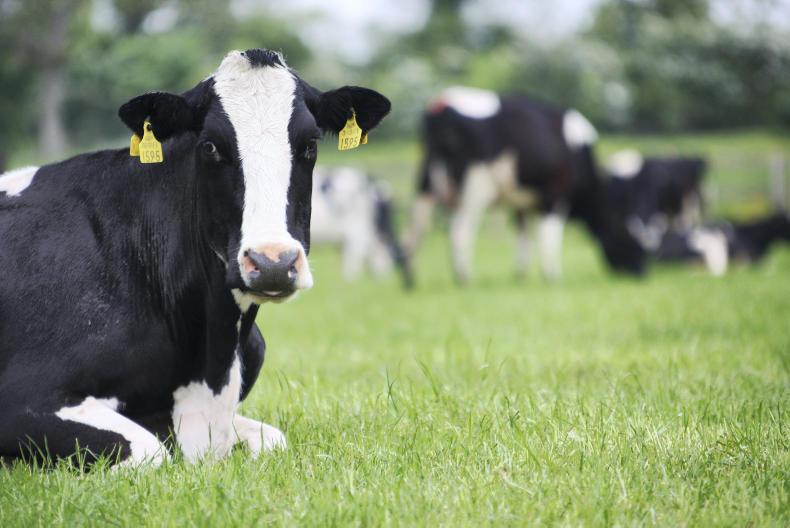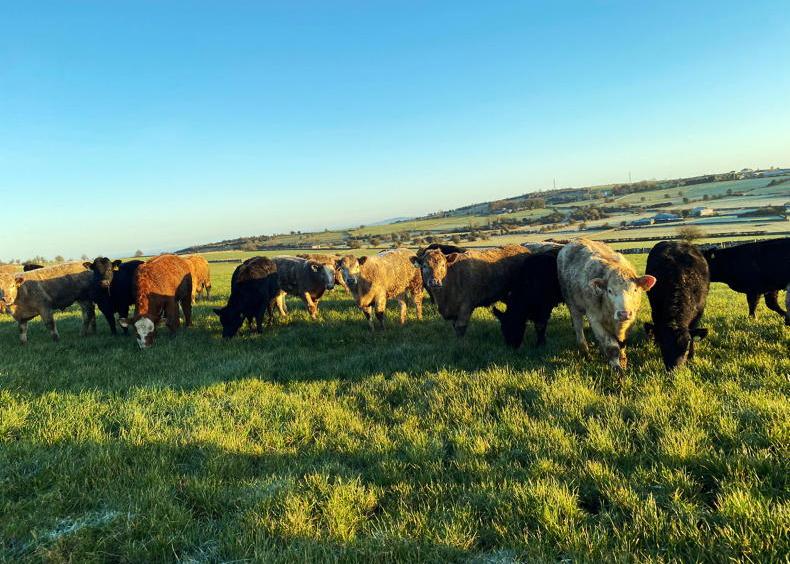Other incidences in different counties have also been reported.
The biggest risk factor is grazing fields with a high clover content, but there are other causes too. Damp, misty weather and hungry grazing a field of lush grass or clover in early morning can be a factor. Often, it is a combination of a couple of things that causes the problem.
Bloat is caused by a build-up of froth in the cow’s rumen, preventing the release of gas. This causes the stomach to swell up and the cow eventually suffocates due to the pressure of the gas.
It is the digestion of lush swards that cause the froth to build up, hence the reason why clover swards are so risky for bloat.
The speed at which bloat can affect a cow is frightening. In severe cases, a perfectly healthy cow can drop dead in the space of 30 or 40 minutes. In other cases, you get more time to react.
Stab
The key thing is to allow the gas to escape and the surest way to achieve this in a down cow is to stab her.
Stab on the left side, one hand-span down from the short ribs and one hand-span in front of the hipbone. Use one firm and clean stab of a decent size (5-10cm) to let the froth out.
For cows suffering from bloat but not bad enough to be stabbed, they can be drenched with bloat oil, paraffin oil or washing up liquid – anything that will break up the froth in the rumen.
Yet prevention is better than cure. Bloat oil can be put through the water if grazing high-risk paddocks.
You can also give a three-hour allocation only when going into a fresh break. This will prevent cows from gorging on clover and force them to eat out the grass too, which will be higher in fibre and help to prevent bloat.
Read more
Clover challenge in Clonakilty
Vet’s corner: CCN, cow bloat and pneumonia all in one week
Other incidences in different counties have also been reported.
The biggest risk factor is grazing fields with a high clover content, but there are other causes too. Damp, misty weather and hungry grazing a field of lush grass or clover in early morning can be a factor. Often, it is a combination of a couple of things that causes the problem.
Bloat is caused by a build-up of froth in the cow’s rumen, preventing the release of gas. This causes the stomach to swell up and the cow eventually suffocates due to the pressure of the gas.
It is the digestion of lush swards that cause the froth to build up, hence the reason why clover swards are so risky for bloat.
The speed at which bloat can affect a cow is frightening. In severe cases, a perfectly healthy cow can drop dead in the space of 30 or 40 minutes. In other cases, you get more time to react.
Stab
The key thing is to allow the gas to escape and the surest way to achieve this in a down cow is to stab her.
Stab on the left side, one hand-span down from the short ribs and one hand-span in front of the hipbone. Use one firm and clean stab of a decent size (5-10cm) to let the froth out.
For cows suffering from bloat but not bad enough to be stabbed, they can be drenched with bloat oil, paraffin oil or washing up liquid – anything that will break up the froth in the rumen.
Yet prevention is better than cure. Bloat oil can be put through the water if grazing high-risk paddocks.
You can also give a three-hour allocation only when going into a fresh break. This will prevent cows from gorging on clover and force them to eat out the grass too, which will be higher in fibre and help to prevent bloat.
Read more
Clover challenge in Clonakilty
Vet’s corner: CCN, cow bloat and pneumonia all in one week









SHARING OPTIONS